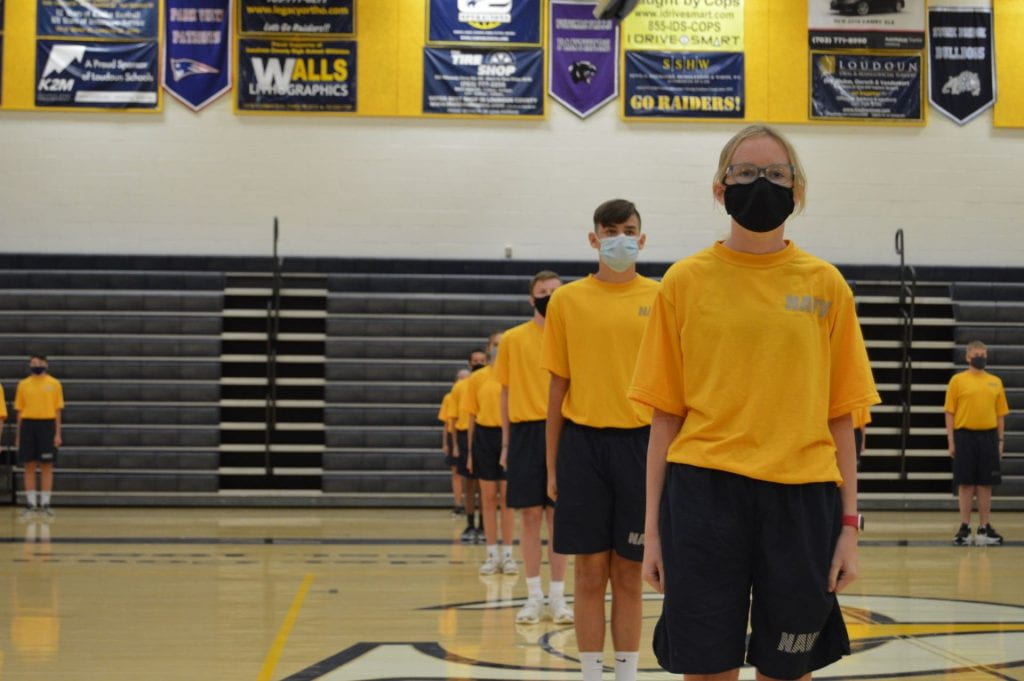Cadets overcome challenges posed by distance learning
Olivia Zavadil | Managing Editor

Incoming ROTC students participate in basic leadership training during the summer. The program was allowed to meet in person during that time if following social-distancing guidelines. Photo courtesy of Deanna Foust.
The NJROTC program has been a key component of our school’s livelihood ever since its doors opened in 2009. The program, which is the only of its kind in Loudoun County, draws participation from students all over Northern Virginia. In a normal year, cadets would participate in hands-on activities that foster the development of important life skills such as leadership and communication. However, a new challenge has presented itself in the form of distance learning.
“In past years, we would go outside to practice marching (drill) and physical training (PT). We have not been able to do that since March of last year,” said Master Chief Deanna Foust. NJROTC instructors have had to find new ways this year to adapt to a mostly virtual learning environment. “Similar to other teachers, we’ve moved much more of our syllabus online, but with NJROTC many of the things we do are hands-on, which makes it more difficult,” said Captain Bill Johns.
With 39 percent of cadets opting to return for hybrid learning, extra precautions have been taken to ensure that the program adheres to the COVID guidelines set forth by LCPS, while still giving students the experiences that they need.
“When it comes to COVID restrictions and guidelines, we follow what the school is doing. If there is a conflict between the school and the Navy, we coordinate with either to resolve it but would take the more restrictive of the two. It hasn’t been an issue though.” Foust said.
All cadets are required to wear masks, and social distancing measures are being put into place when needed. For example, wherein a normal year for drill cadets would stand 2-3 feet apart, they now stand 6 feet apart.
As for the physical training aspect, instructors have found a way to incorporate workouts into distance learning as well. This is accomplished by cadets completing short, stationary exercises from home while on a Google Meet.
The biggest change in the program, however, would be the lack of participation in competitions due to COVID restrictions put forth by the county. “This has been the most dramatic change,” Johns said. “ We used to have three or four competitions a month per team; most of those have gone away,”. Teams such as orienteering have taken an especially big hit, as it is almost impossible to compete virtually in that type of competition.
“The competitions we would normally attend, especially for the younger cadets, they get a really good sense of the discipline and comradery that many are drawn to, and from that motivate them to go into the military,” Johns said.
However, despite the challenge, some teams have still found impressive successes in virtual competitions. “ We were able to compete fully (with COVID guidelines) in our CyberPatriot competitions because they were held here at the school. One of our teams even placed first in their tier!” Foust said. Additionally, the Academic Team competed virtually in the National Academic Exam for NJROTC and placed 9th in the DMV.
“For those cadets and parents who allow participation in person, we’ve been holding practices throughout the year, although the quantity of these practices has reduced,” Johns said. While in previous years teams would have ample amounts of practice time every week, COVID guidelines require a reduced number of cadets in the annex building, and a reduced number of teams allowed to practice at one time. As a result, teams can only practice one or two times a week, and can only have a limited number of cadets present at each session.
“Because we are not able to do hands-on training, the way we do military drill has suffered because the cadets have not been able to practice and receive hands-on tutoring from instructors and mentors; that is one of the key areas distance learning has hurt our program,” Johns said.
While cadets still have knowledge of the military and knowledge of the program in an academic sense, distance learning in most cases has taken away the aspect of the first-hand experience. “We have suffered in the sense of not being able to take trips and give cadets exposure to the military,” Johns said.
In previous years, cadets visited military installations, toured college campuses such as West Point and the Naval Academy, visited the Pentagon, and explored the Marine Corps Museum. “Those orientation visits help students get an early insight into what might be in store for them later on, and give motivation to those who might be on the fence about joining the military,” Johns said . In an attempt to continue providing these important experiences, students this year have participated in virtual tours of important sites during class.
While distance learning has posed many challenges, there is still a positive takeaway from the difficulties. “We’ve all learned so many other skills that I believe prepare cadets for the bumps in the road that are sure to happen in the future. We’ve all been able to adapt and overcome many challenges as we’ve navigated the waters of COVID,” Foust said.
